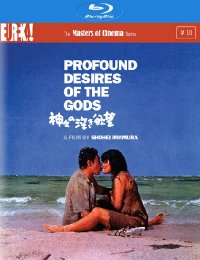Profound Desires of the Gods: The Masters of Cinema Series
One of the unfortunate aspects of being a film addict is that the more you learn about film, the more directors you come across and the more films you realise you haven't seen. This is the case with Shôhei Imamura, a man generally recognised as a terrific independent director and a real visionary amongst all of the great directors to have originated from Japan. Imamura made films that challenged the status quo and were as much travel documentaries as they were entertainment. As a man with a keen interest in social anthropology, he clearly felt that his place as a filmmaker involved an obligation to educate and inform so his films weren't exactly a bundle of laughs but gave the viewer plenty to get their teeth into.
Set on the fictional island of Kurage in the Okinawa Archipelago, Profound Desires of the Gods follows the Futori family as the island around them undergoes a process of development when an engineer from the mainland arrives with a view to building a plant there which will change the islanders' way of life forever.
The Futori family are a pretty odd bunch as the patriarch is on his own, either widowed or estranged from his wife, I didn't find it was ever made clear which, but would have to go with widowed based on some of the exchanges with his grandson, who also happens to be his son, given the level of incest within the family. This inbreeding has left the daughter/sister a nymphomaniac imbecile who is believed to have some connection to the gods, so she is believed to be a noro, or Shaman. Her brother/lover tries to keep her on a (metaphorical) leash and her behaviour in check, but this is more difficult than it seems, especially as she keeps crying out that her ear is itchy for no apparent reason.
Another member of the Futori family, Toriko, has spent almost his entire life digging a hole so that a huge boulder, that was washed up on to the island by a tidal wave, can fall down and allow the barren fields to fill up with water so they can once again be used as paddy fields to grow rice rather than sugar cane. Toriko also has an incestuous relationship with his sister, Uma, but doesn't want to be with her on a permanent basis until his work is done but Uma, wants to get on with her life much to his chagrin.
Amongst all this madness, the engineer from Tokyo is trying to scout out where the best water supply can be found and finds himself having to choose between laying a 5 km pipeline and keep the islanders on speaking terms or risk their wrath and use the water from the temple which is much closer to where he wants the factory to be situated. As a sane man in an insane situation, he is completely out of his depth and is a fish out of water; he may as well be the only insane man on an island full of people who are sane.
As scholar Tony Rayns explains in his introduction, Imamura spends a great deal of time exploring the islanders relationship to nature and, as an 'uncivilised' society, they have yet to develop beyond the traditional hunter/gatherer period and into a more enlightened time with art, poetry and heavy industry. What they do have is an island elder who sings a song about the island's formation, which was between a brother god and his goddess sister -- in this respect, Nekichi and Kametarô can be seen to represent the god and goddess.
Apparently Shôhei Imamura spent almost the entire decade leading up to this film in 1968 making films about underdeveloped areas and people on the fringes of society so watching this without having seen any of those is really going in at the deep end. Despite having never seen a film by Imamura, I found this surprisingly watchable, and not too difficult to understand and digest. I have read that it went way over the initial schedule of six months, taking about three times that length of time to complete and that certainly shows on screen as the actors have had so much time to get into character that you believe that they are real people and, at times, I felt that this was almost a documentary!
Profound Desires of the Gods isn't the easiest film to watch as there is some fairly difficult subject matter (especially the incest) and, whilst it is far from impenetrable, it is a challenging film. It certainly isn't something to put on when you want to chill out and relax one evening; it is a film that demands your attention and not only for 90 or 100 minutes, but for just under three hours. It is one of those films where you get out what you put in and, if you invest time and energy in the film, it does pay back.
The Disc
Extra Features
The introduction by film scholar Tony Rayns (in 1080i) is a lengthy and comprehensive overview of the film that is probably worth watching afterwards so as not to prejudge the movie. Rayns certainly knows his stuff and explains where this fits into Japanese cinema, the importance of Okinawa as a filming location and Shôhei Imamura's place as a filmmaker. The disc also contains the original Japanese trailer (in 1080p).
As is usually the case with a Masters of Cinema release, this comes with a fascinating booklet containing an essay by Tony Rayns and a couple of translated interviews with Shôhei Imamura and is a thoroughly rewarding read.
The Picture
The 1080p picture does a fantastic job with the colours, showing the vibrant greens and blues of the flora and sky and sea but it is less impressive when it comes to the contrast levels as the darker scenes can be a little bit muddy and difficult to make out; the clarity and detail levels in these nighttime scenes certainly isn't as impressive as it should be.
Filming in Okinawa (or on one of the small islands that comprise the archipelago) pays dividends, just as American films that are shot in Hawaii to double up as a desert island. The island has all of the native features that are part of the narrative and it certainly looks the part.
The Sound
The DTS-HD Master Audio 1.0 Mono soundtrack presents the dialogue clearly enough and, whilst there is nothing to write home about when it comes to the thunderstorms, the bulk of the film is front loaded and dialogue dominated so there is really no need for an artificial surround soundtrack; this was, after all, recorded in Mono.
Final Thoughts
Prior to watching this film, I hadn't come across Shôhei Imamura's work and this was an area of Japanese cinema there was a complete mystery to me. Such a fascinating film requires a fascinating director and, once I have worked my way through my pile of unwatched discs, I will investigate Imamura further and shall look forward to becoming more acquainted with his oeuvre. Profound Desires of the Gods is a really interesting and challenging piece of work that will probably require another viewing to fully appreciate it and that is something which I'm looking forward to doing.
Although the disc is not exactly bursting at the seams with extra features, the filmed introduction is as good as any commentary you will get without there actually being a commentary, such is the depth of Rayns' material.



















































Your Opinions and Comments
Be the first to post a comment!